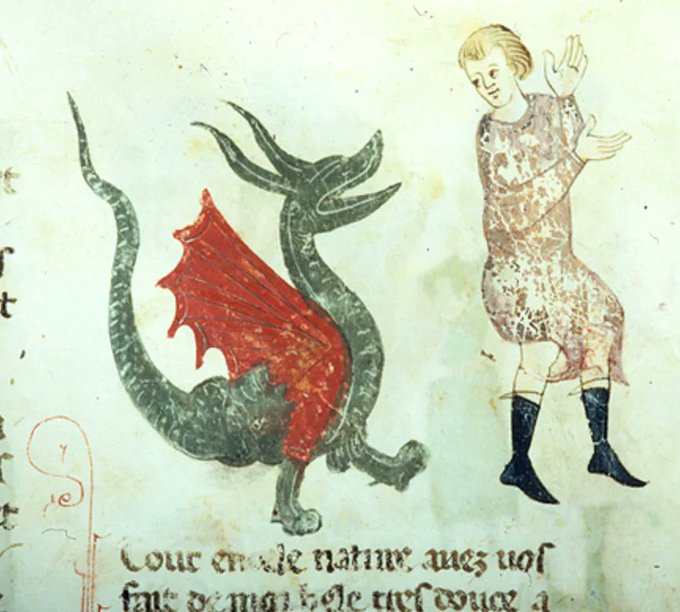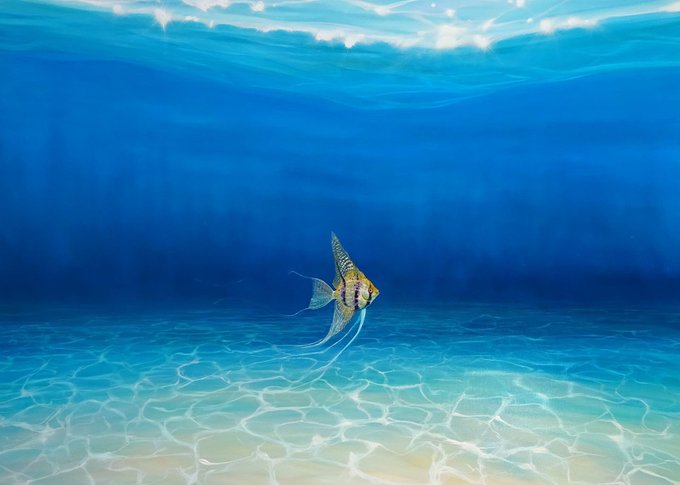WOTD:のTwitterイラスト検索結果。 26 件
#OldEnglish #WOTD: feþer, f.n: feather; quill, pen. (FEH-ther / ˈfɛ-θɛr) Image: Stork in Gerald of Wales’s Topography of Ireland; N England (Lincoln?), c. 1196-c.1223; @BLMedieval Royal 13 B VIII, f. 9v.
#OldEnglish #WOTD: ā-melcan, str.v: to milk. (ah-MELL-kahn / a-ˈmɛl-kan) Image: Bestiary; S England (Salisbury?), 2nd quarter of 13th century; @BLMedieval Harley 4751, f. 23r.
#OldEnglish #WOTD: ge-sweorc, n.n: cloud, mist, smoke. (yeh-SWEH-ork / jɛ-ˈswɛɔrk) Image: Getty Apocalypse; England (probably London), c. 1255-60; @GettyMuseum MS. Ludwig III 1, f. 21r.
My WotD: Kyrofelonoshophobia
a morbid or irrational fear of cartoon characters
#WOTD #WordOfTheDay
#OldEnglish #WOTD: folgian, wk.v: to follow. (FOL-yih-ahn / ˈfɔl-jɪ-an) Image: Bestiary; N Italy, c. 1290; @MorganLibrary MS M.459, f. 5r.
My WotD: Cabotage
trade or transport in coastal waters or between 2 points in a country
#WOTD #WordOfTheDay
#OldEnglish #WOTD: wæterian, wk.v: to water, supply with water. (WAE-teh-ri-ahn / ˈwæ-tɛ-rɪ-an) Image: Luttrell Psalter; N England (Lincolnshire), 1325-1340; @BLMedieval Add MS 42130, f. 181r.
#OldEnglish #WOTD: hrēre-mūs, f.n: bat. (HRAY-ruh-MOOS / ˈhreː-rə-ˌmuːs) Image: Aberdeen Bestiary; England, c. 1200; @aberdeenunilib Univ. Lib. MS 24, f. 51v.
My WotD: Feretrophobia
a morbid or irrational fear of caskets, coffins, & being buried alive
#WOTD #WordOfTheDay
My WotD: Chionoandrophobia
a morbid or irrational fear of snowmen
#WOTD #WordOfTheDay
#OldEnglish #WOTD: spellian, wk.v: to talk, converse, discourse; to announce, proclaim, utter, tell. (SPEH-li-ahn / ˈspɛ-lɪ-an) Image: Morte Artu; France (St Omer or Tournai?), c. 1315-1325; @BLMedieval Royal MS 14 E iii, f. 146r.
My WoTD: Cupidity
greed of gain
#WordOfTheDay #WOTD
My WoTD: Coruscating
flashing; sparkling; brilliant; clever; humourous; scathing
#WordOfTheDay #WOTD #HPLovecraft
#OldEnglish #WOTD: regn-scūr, m.n: a shower of rain, a shower. (RAYN-shoor) Image: Croesus in John Lydgate’s trans. of Boccaccio’s Fall of Princes; England (probably Suffolk), c. 1450-60; @BLMedieval MS Harley 1766, f. 133r.
#OldEnglish #WOTD: lēac-tric, m.n: a lettuce. (LAY-ock-tritch) Image: Tacuinum Sanitatis of Rouen, early 15th century; Rouen nouvelles bibliothèques via @BibliOdyssey. Patrons, you have 1 week to send me your words for #GoldgifaWeek! Find out more: https://t.co/wrbzVliH1R.
#OldEnglish #WOTD: mēdren, adj: maternal, (of lineage) on the mother's side. (MAY-dren) Image: French Book of Hours, c. 1440; @MorganLibrary MS M.63, f. 65r.
#OldEnglish #WOTD: umbor, n.n: a child. (“OOM-bor”) Image: @MorganLibrary
#WOTD: Carcinology. The scientific study of crustaceans. Enjoy 1830s crustacean #SciArt via @museumnaturalis https://t.co/Izaw8IIfCz
#OldEnglish #WOTD: ūle, f.n: an owl. (“oo-leh”) Image: @MorganLibrary






























